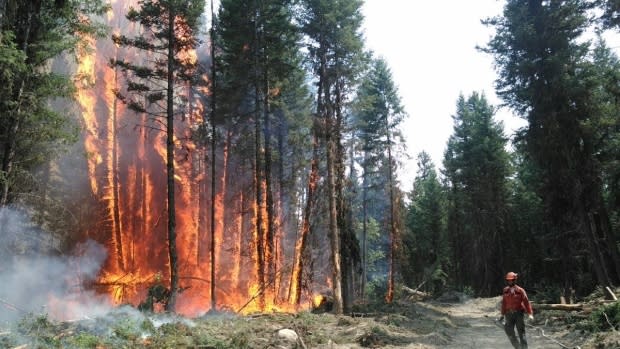More wildfire supports needed for isolated indigenous communities: report
The Tsilhqot'in Nation is calling for improved wildfire training for Indigenous crews in a report that says the Chilcotin region saw delayed and unequal protection during the record-breaking 2017 wildfire season.
The report, released by the First Nation, says there were jurisdictional challenges that led to conflict and confusion while crews and community members tried to battle two of the largest wildfires in the province.
Consequently, the physical and mental health of residents were disproportionately impacted by the fires, the report states.
The First Nation has released 33 calls to action — recommendations to meet the community's needs as it becomes more vulnerable to wildfire risk — a list that includes developing an Indigenous-led emergency centre in the territory, and increased financing to train Tsilhqot'in crews.
The report, titled The Fires Awakened Us, states that forests in the region are becoming increasingly combustible due to insect infestations and forestry practices.

Conflict and confusion
According to the report, the community had inadequate funding for emergency preparedness. Once responders arrived, there was conflict over jurisdiction causing "numerous stumbles, which left communities, land and resources vulnerable to the impending wildfires within the territories of the Tsilhqot'in."
During the wildfire season, the Tl'etinqox Government — one of the six Tsilhqot'in communities — decided not to issue an evacuation order, inciting a "negative reaction" by government officials.
"Attempts were made to impose an evacuation of citizens by intimidation and persuasion by governmental authorities and threats of child apprehension," the report states.
"No one seemed to contemplate the fact that Tsilhqot'in leadership was in the best position to make decisions in the best interests of its communities," it says.
The First Nation is calling on all levels of government to recognize its inherent Indigenous jurisdiction during emergency response and to incorporate traditional knowledge into suppression efforts.
Cultural sensitivity
"It's very traumatic for your people to do this, to go through something like this," said Chief Joe Alphonse, who has been an outspoken critic of the province's wildfire response.
Alphonse says the Chilcotin region is experiencing extremely dry weather conditions, and the community is anticipating more difficult wildfire seasons in the years ahead.
Among its calls to action, the First Nation is pushing for new and improved firehalls.
It's also addressed the need for its own culturally-sensitive emergency response centre on its territories.
"Our spirituality, how we live, the type of diets that we have — we know all of those things," said Alphonse. "We won't be putting people in cafeterias like we went through in residential schools, and stuff like that. It's appropriate that we look after ourselves."
B.C.'s forests minister, Doug Donaldson, says the province is now working alongside the federal government and the Tsilhqot'in Nation to determine the financial and human resources that will be needed to bring the recommendations to fruition.
Donaldson said about 18 per cent of the recommendations have already been implemented following feedback from both the 2017 and 2018 wildfire seasons.


